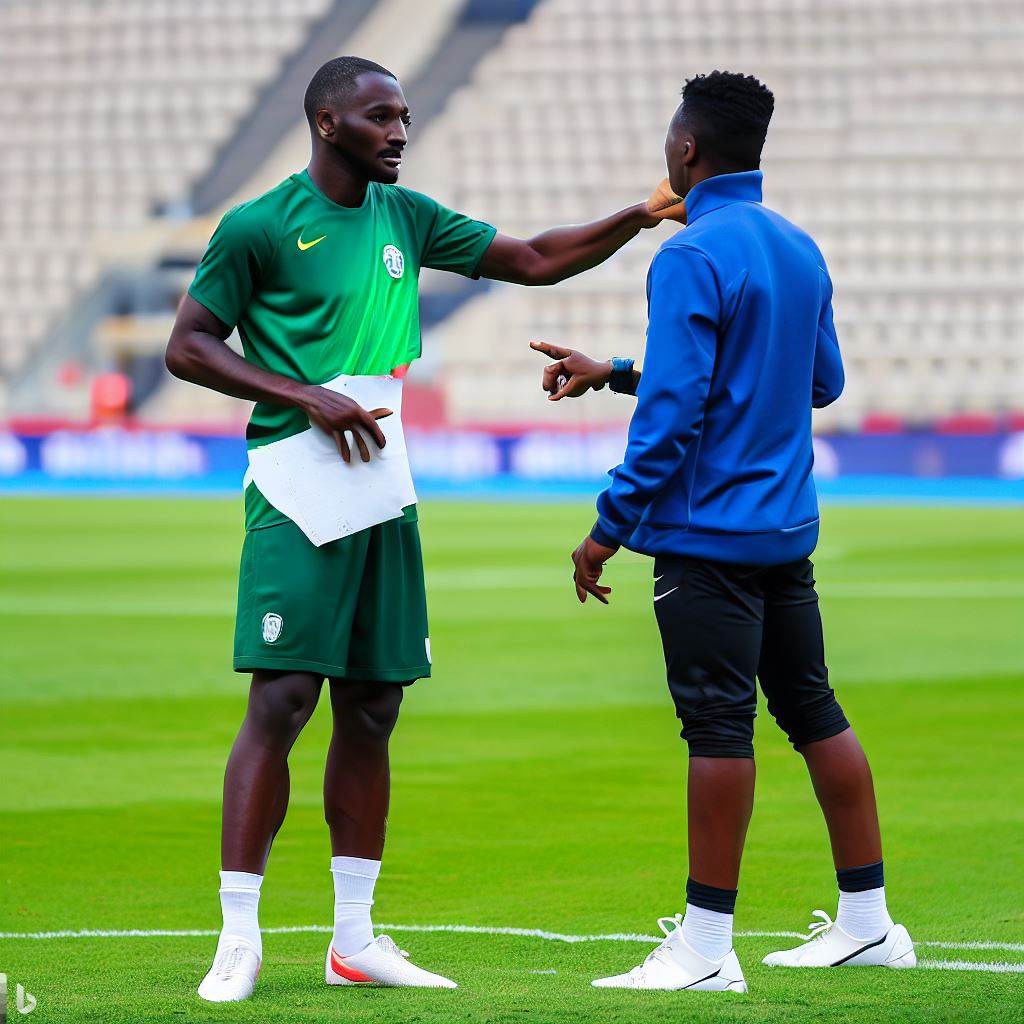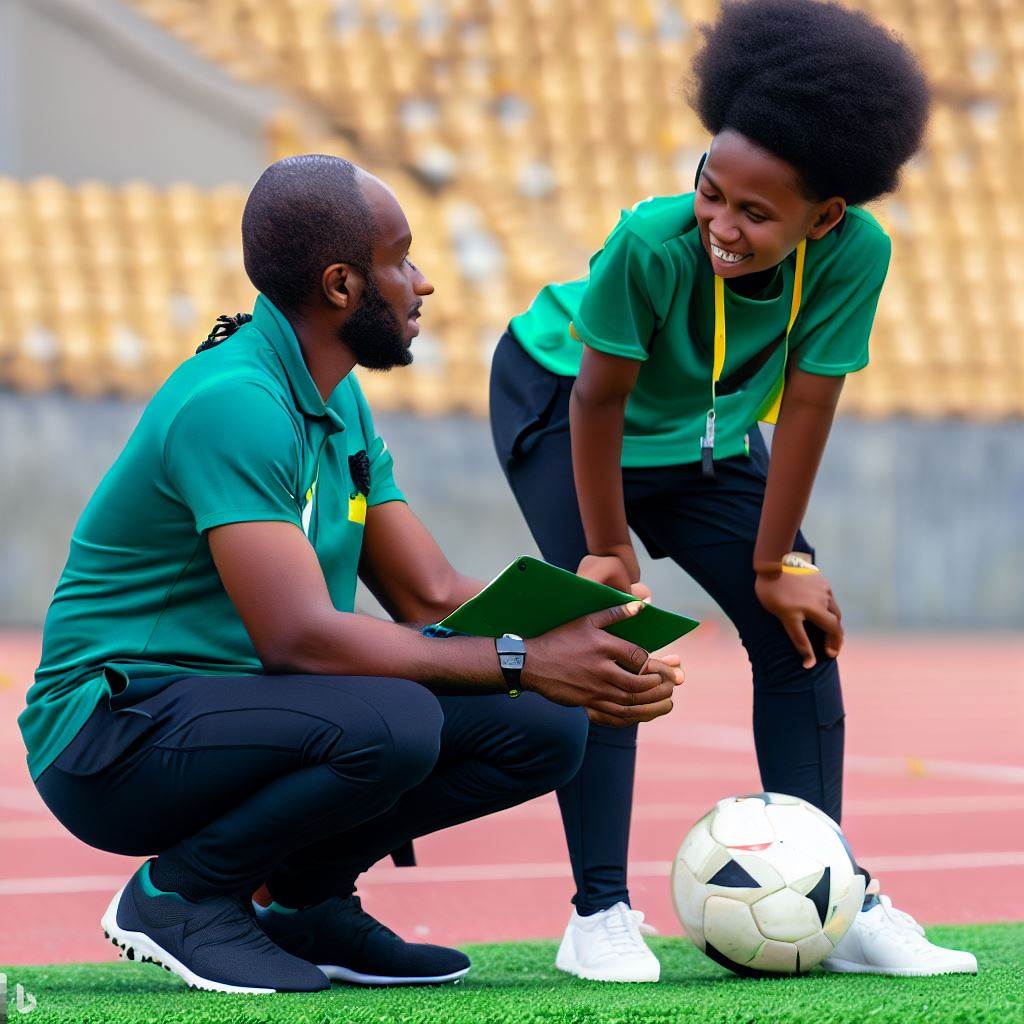Introduction
Assistant coaching in Nigeria is a crucial topic to explore, as it sheds light on the unique dynamics and cultural considerations present in coaching in this country.
The importance of cultural insights in coaching cannot be overstated, as it allows coaches to navigate and understand the context in which they are working.
Exploring Assistant Coaching in Nigeria
Assistant coaching in Nigeria plays a vital role in supporting and developing athletes in various sports disciplines.
Coaches have the opportunity to impart their knowledge and expertise to aspiring athletes, helping them reach their full potential.
Cultural insights are crucial in coaching, especially in a diverse country like Nigeria.
Understanding the cultural nuances, beliefs, and values of the athletes is essential for effective communication and relationship-building.
Nigerian athletes come from different ethnic backgrounds, and each has its own traditions and customs.
Coaches must be sensitive to these differences and adapt their coaching styles to meet the needs of each individual athlete.
In Nigeria, respect for authority is deeply ingrained in the culture.
Coaches should establish a hierarchy within their coaching staff and clearly define roles and responsibilities.
Religion is also an important aspect of Nigerian culture.
Coaches must be aware of religious practices and holidays to accommodate the athletes’ needs and ensure inclusivity.
Gender roles and expectations may vary across different regions in Nigeria.
Coaches must be mindful of these differences and create an inclusive and supportive environment for all athletes, regardless of their gender.
Language is yet another cultural consideration in coaching.
Coaches should make an effort to learn and understand the local languages to effectively communicate with the athletes and gain their trust.
In addition, cultural insights are essential in assistant coaching in Nigeria.
Coaches must recognize and appreciate the diverse cultural factors that influence their athletes to create a positive and inclusive coaching environment.
Understanding the Nigerian Coaching Landscape
In recent years, sports coaching in Nigeria has seen a significant growth and has become an integral part of the sporting culture in the country.
This section will delve into the reasons behind this growth, the popularity of certain sports, and the importance of assistant coaching in developing talent.
Growth of Sports Coaching in Nigeria
- The interest in sports coaching in Nigeria has grown due to the country’s rich sporting heritage.
- With successful athletes such as Kanu Nwankwo and Austin Okocha, Nigerians have been inspired to pursue coaching.
- The Nigerian government has also recognized the potential of sports coaching in nurturing talent and promoting physical fitness.
- As a result, they have invested in sports academies and coaching programs at various levels.
- These initiatives have not only encouraged aspiring coaches but have also improved the overall quality of coaching in the country.
Overview of Popular Sports in Nigerian Culture
Nigerians have a deep-rooted passion for sports, and certain sports hold significant cultural importance.
Here are some of the popular sports in Nigerian culture:
- Football: Football is the most popular sport in Nigeria and has a massive following.
- Track and Field: Nigerians have excelled in athletics, particularly in sprinting and long-distance running.
- Basketball: Basketball has gained popularity in recent years, with Nigerian players making their mark in the NBA.
- Boxing: Nigeria has produced world-class boxers like Anthony Joshua and Samuel Peter.
Importance of Assistant Coaching in Developing Talent
Assistant coaching plays a crucial role in the development of sporting talent in Nigeria. Here’s why:
- Assistant coaches provide support and guidance to athletes, helping them hone their skills and reach their full potential.
- They assist head coaches in planning and implementing training programs, ensuring athletes receive personalized attention.
- Assistant coaches also act as mentors, instilling discipline, dedication, and teamwork values among athletes.
- By working closely with head coaches, they contribute to strategic decision-making, improving overall team performance.
- Assistant coaching offers a pathway for aspiring coaches to gain experience and eventually become head coaches themselves.
In essence, the growth of sports coaching in Nigeria reflects the country’s passion for sports and the recognition of its potential in nurturing talent.
Football, track and field, basketball, and boxing are among the popular sports in Nigerian culture.
Assistant coaching plays a crucial role in developing talent by providing support, guidance, and mentorship.
With the continued investment in coaching programs, Nigeria is poised to produce even more successful athletes in the future.
Read: Assistant Coaches: A Voice in Nigerian Athletics
Cultural insights in Nigerian coaching
Nigerian values and traditions that influence coaching methods
Nigeria, a country in West Africa, is known for its rich cultural heritage and diverse traditions.
These cultural values greatly influence the coaching methods adopted in various sports disciplines.
One significant value embedded in Nigerian culture is respect. Nigerian coaches emphasize the importance of showing respect to authority figures, such as team captains and coaches.
This value is instilled in athletes from a young age, as they are taught to listen and obey their coaches without question.
Another important tradition that influences coaching methods in Nigeria is the concept of hierarchy.
Nigerian society has a strong hierarchical structure, and this is replicated in sports coaching.
Coaches are seen as the ultimate authority figure, and players are expected to follow their instructions implicitly.
This hierarchical structure helps maintain order and discipline within the team.
Discipline is a key aspect of coaching in Nigeria. Coaches place a strong emphasis on discipline as a means to achieve success in sports.
Athletes are expected to adhere strictly to training schedules, maintain a healthy lifestyle, and exhibit self-control on and off the field.
Discipline is believed to be the foundation of success in Nigerian sports, and coaches work tirelessly to instill this value in their athletes.
Analysis of the role of respect, hierarchy, and discipline in coaching
Respect, hierarchy, and discipline play crucial roles in shaping the coaching landscape in Nigeria.
The deep-rooted cultural values associated with these concepts shape the coach-athlete relationship and overall coaching methods.
The emphasis on respect in Nigerian coaching is twofold. Firstly, athletes are expected to show respect and obedience to their coaches, as mentioned earlier.
This allows for effective communication between coaches and athletes, as the athletes acknowledge the coach’s expertise and authority.
Secondly, coaches also emphasize the importance of respect between teammates.
Respect for fellow athletes fosters a positive team dynamic and helps in achieving collective goals.
Hierarchy, closely associated with respect, exists in Nigerian coaching to ensure order and organization within the team.
The hierarchical structure allows for clear lines of authority and decision-making.
Coaches are responsible for making strategic decisions, and athletes follow their instructions without question.
This system ensures that the coaching process is streamlined and efficient.
Discipline is the driving force behind Nigerian coaching methods.
Coaches believe that discipline instills dedication, commitment, and perseverance in athletes.
By adhering to strict training regimens and maintaining disciplined lifestyles, athletes are able to reach their full potential.
Discipline also teaches athletes the value of hard work, sacrifice, and self-control, key traits in achieving success in sports.
Emphasis on teamwork and community in Nigerian sports
In Nigerian sports, there is a strong emphasis on teamwork and community.
This emphasis stems from the communal nature of Nigerian society and the belief that collective effort leads to success.
Nigerian coaches emphasize the importance of teamwork in achieving goals.
Athletes are encouraged to work together, support each other, and prioritize the team’s success over personal achievements.
This collaborative approach is believed to maximize team performance and enhance overall results.
Furthermore, Nigerian sports teams often act as a close-knit community.
Athletes form strong bonds and develop a sense of camaraderie.
This sense of community extends beyond the playing field, as athletes support and motivate each other beyond the sports arena.
The unity and support within the team foster a positive and inclusive environment, contributing to the overall success of Nigerian sports teams.
Lastly, Nigerian coaching methods are heavily influenced by the cultural values and traditions of the country.
Respect, hierarchy, and discipline shape the coach-athlete relationship and ensure order and organization within the team.
Additionally, the emphasis on teamwork and community fosters a sense of unity and collective effort, leading to successful outcomes in Nigerian sports.
The combination of these cultural insights makes Nigerian coaching methods unique and effective in producing talented athletes.
Read: A Day in the Life: Assistant Athletic Trainer in Nigeria
Challenges faced by assistant coaches in Nigeria
Assistant coaching in Nigeria can be a challenging endeavor due to several cultural differences between foreign and Nigerian assistant coaches.
These differences can present potential challenges in terms of communication, coaching style, and adaptability.
However, with the right approach, assistant coaches can navigate and overcome these challenges.
Here are some examples of how they can do so:
1. Understanding and Embracing Cultural Differences
One of the first challenges for assistant coaches in Nigeria is to explore and understand the cultural differences between themselves and the local coaches.
This includes differences in language, traditions, values, and coaching approaches.
By actively learning about
Nigerian culture and embracing these differences, assistant coaches can build stronger relationships with local coaches and players.
2. Effective Communication
Effective communication is essential for assistant coaches to convey their ideas, strategies, and instructions to both players and fellow coaches.
However, communication barriers can arise due to language differences or different communication styles.
Assistant coaches should make an effort to learn key phrases or terms in the local language, use clear and concise language, and adapt their communication style to fit the Nigerian context.
3. Adapting Coaching Style
Assistant coaches may find that their coaching style needs to be adapted to suit the Nigerian context.
Nigerian players may respond differently to certain coaching methods or have different expectations of their coaches compared to foreign players.
Assistant coaches need to be flexible and open to adjusting their coaching style to ensure they connect with and motivate Nigerian players effectively.
4. Building Trust and Rapport
Building trust and rapport with local coaches and players is crucial for assistant coaches in Nigeria.
Trust takes time to develop, but assistant coaches can foster it by showing genuine interest in the players’ development, actively listening to their concerns, and providing constructive feedback.
By building strong relationships, assistant coaches can create a positive coaching environment and improve their overall coaching effectiveness.
5. Respecting Local Practices and Customs
Assistant coaches must respect and adapt to local practices and customs, even if they differ from their own cultural norms.
This includes respecting local traditions, adhering to local protocols, and being mindful of cultural sensitivities.
By doing so, assistant coaches can avoid potential conflicts and demonstrate their commitment to integrating into the local coaching system.
Publish Your Professional Profile, Business or Brand
Showcase your expertise, gain trust, and boost visibility instantly on Professions.ng.
Publish Now6. Seeking Local Guidance and Support
Assistant coaches should actively seek guidance and support from local coaches who have a deep understanding of the Nigerian coaching landscape.
Local coaches can provide insights, advice, and valuable connections that can help assistant coaches navigate the unique challenges they may face.
Collaborating with local coaches can lead to a more successful coaching experience.
7. Continuous Learning and Adaptability
To overcome the challenges faced in Nigeria, assistant coaches must be willing to continuously learn and adapt their coaching methods.
This could involve attending local coaching seminars or workshops, learning from experienced Nigerian coaches, and staying updated with the latest trends and techniques in Nigerian football.
By embracing a growth mindset, assistant coaches can enhance their coaching skills and better connect with the players.
Basically, being an assistant coach in Nigeria comes with its fair share of challenges due to cultural differences.
However, by understanding and embracing these differences, effectively communicating, adapting coaching styles, building trust, respecting local practices, seeking local guidance, and continuously learning, assistant coaches can overcome these challenges and make a positive impact on Nigerian football.
Read: Courses for Assistant Athletic Trainers in Nigeria: Guide

Benefits of incorporating cultural insights in assistant coaching in Nigeria
In today’s globalized world, understanding and appreciating cultural differences is essential for effective coaching.
When it comes to assistant coaching in Nigeria, incorporating cultural insights can have numerous benefits.
Here, we will discuss how cultural understanding enhances coaching effectiveness, the advantages of building trust and rapport with Nigerian athletes, and successful coaching experiences resulting from cultural insights.
1. Enhanced coaching effectiveness through cultural understanding
- Awareness of cultural norms and values allows coaches to adapt their coaching style to better align with Nigerian athletes.
- Understanding Nigerian athletes’ cultural backgrounds helps coaches identify their motivations and tailor training strategies accordingly.
- Cultural misunderstandings can lead to miscommunication, therefore, cultural insights enable effective communication between coaches and athletes.
- By embracing cultural diversity, coaches can create a supportive and inclusive environment, fostering athletes’ growth and development.
- Coaches who have cultural knowledge can identify and address cultural barriers that may hinder athletes’ performance.
2. Building trust and rapport with Nigerian athletes
- Developing an understanding of Nigerian cultural practices builds trust with athletes, allowing them to feel valued and respected.
- Respecting Nigerian athletes’ cultural traditions and beliefs helps coaches establish a positive coach-athlete relationship.
- Coaches who incorporate cultural insights can better motivate and inspire Nigerian athletes to reach their full potential.
- Showing cultural sensitivity demonstrates coaches’ commitment to the overall well-being of their athletes.
- By creating a sense of belonging, coaches can encourage Nigerian athletes to perform at their best and overcome challenges.
3. Successful coaching experiences resulting from cultural insights
- Coaches who incorporate cultural insights report improved athlete satisfaction and performance.
- Understanding the importance of family and community in Nigerian culture enables coaches to provide appropriate support and guidance.
- Coaches who embrace Nigerian cultural practices can effectively navigate challenges and conflicts within the team.
- Cultural insights help coaches celebrate diversity and create an inclusive team environment.
- By embracing Nigerian cultural values and traditions, coaches can inspire athletes and enhance team cohesion.
Most importantly, incorporating cultural insights in assistant coaching in Nigeria has several benefits.
It enhances coaching effectiveness, builds trust and rapport with athletes, and leads to successful coaching experiences.
By understanding and appreciating cultural differences, coaches can create a supportive and inclusive environment, motivate athletes, and facilitate their growth and development.
Cultural insights are essential for building strong relationships with Nigerian athletes and helping them reach their full potential.
Read: Ethics and Best Practices: Athletic Training in Nigeria
Tips for assistant coaches in Nigeria
Being an assistant coach in Nigeria can be an incredibly rewarding experience, but it can also come with its own set of challenges.
In order to effectively coach and communicate with Nigerian athletes, it is important to gain cultural insights and develop cross-cultural coaching skills.
Below are some practical tips to help assistant coaches better understand Nigerian athletes and succeed in their coaching role:
Gaining cultural insights
- Immerse yourself in the Nigerian culture and try to understand their values and traditions.
- Build relationships with local coaches, athletes, and community members to gain a deeper understanding of their perspectives
- Observe and participate in local sporting events to better comprehend the passion and enthusiasm Nigerian athletes have for their sports.
- Read books or articles about Nigerian history, culture, and sports to gain a broader knowledge base.
Developing cross-cultural communication and coaching skills
- Learn basic Nigerian greetings and phrases to establish rapport and show respect to athletes.
- Be patient and listen actively, as Nigerians may have different communication styles and express themselves differently.
- Adapt your coaching techniques to suit Nigerian athletes’ learning styles and preferences.
- Be aware of non-verbal cues and body language, as they can convey important messages in Nigerian culture.
- Be open to feedback and willing to adjust your coaching methods based on the needs and preferences of the athletes.
Learning from Nigerian coaches and athletes
- Recognize the expertise and experience of Nigerian coaches and athletes.
- Show respect for their knowledge and seek opportunities to learn from them.
- Collaborate with Nigerian coaches to combine different coaching styles and strategies for the benefit of the athletes.
- Engage in open discussions and exchange ideas with Nigerian athletes to foster a positive learning environment.
- Embrace the cultural diversity and unique perspectives that Nigerian coaches and athletes bring to the coaching process.
Being an assistant coach in Nigeria can be a transformative experience both personally and professionally.
By gaining cultural insights, developing cross-cultural communication and coaching skills, and learning from Nigerian coaches and athletes, assistant coaches can establish a strong connection with their athletes and help them reach their full potential.
Embracing the rich Nigerian culture and incorporating it into coaching practices will not only enhance the coaching process, but also create a sense of belonging and unity among the coaching staff and athletes.
Conclusion
Understanding and appreciating cultural insights is crucial for assistant coaching in Nigeria.
It enables coaches to develop effective strategies to connect with players and optimize their performance.
Assistant coaches should embrace cultural differences as opportunities for growth.
By respecting the local customs, traditions, and values, coaches can establish strong relationships with players and gain their trust and loyalty.
Culturally aware coaching can have a profoundly positive impact in Nigeria.
It fosters inclusivity and promotes unity among players from diverse backgrounds, leading to a stronger team dynamic and improved performance on the field.
In summary, cultural insights in assistant coaching in Nigeria are not just important, but essential.
Coaches who understand and embrace cultural differences will create a supportive and inclusive environment that cultivates growth, unity, and success.




